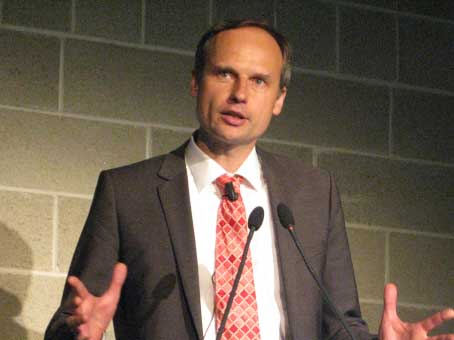
The Atrial Fibrillation Network (AFNET) association and the European Society of Cardiology (ESC) are initiating a new trial (NOAH – AFNET 6) investigating whether patients without diagnosed atrial fibrillation who present with atrial high rate episodes (AHRE) benefit from oral anticoagulation. Paulus Kirchhof (University of Birmingham Centre for Cardiovascular Sciences, Birmingham, UK and Department of Cardiology and Angiology, University of Munster, Germany), chairman of AFNET and principal investigator of the trial, speaks to Cardiac Rhythm News about the rationale and design of this study.
What is the rationale to undertake a trial like NOAH – AFNET 6?
Oral anticoagulation can prevent ischaemic strokes and reduce mortality in patients with diagnosed atrial fibrillation. Whether this pertains to patients with atrial high rate episodes picked up by implanted devices is not known. NOAH – AFNET 6 (Non-vitamin K antagonist oral anticoagulants in patients with atrial high rate episodes) will test the value of oral anticoagulation in this population. A growing number of patients benefit from implanted devices for a variety of indications, and atrial high rate episodes are among the most common arrhythmias picked up in these populations. The optimal antithrombotic management in patients without atrial fibrillation, but with atrial high rate episodes, is not known.
What is innovative about this trial?
NOAH –AFNET 6 tests whether the therapy of choice for patients with diagnosed atrial fibrillation who are at risk of a stroke can be applied to patients who only present with atrial high rate episodes, which are regarded by some as a precursor or as a first sign of atrial fibrillation. This assumption has, however, never been tested.
Could you summarise key aspects of the design?
NOAH – AFNET 6 is a double blind, randomised, prospective, multicentre, parallel group trial run in Europe. Patients 65 years or older with documented atrial high rate episodes and one additional CHA2DS2VASc factor will be included. We will determine established indications in the inclusion criteria for antiplatelet therapy and provide blind aspirin or blind placebo for patients not receiving anticoagulation. Patients randomised to non-vitamin K antagonist oral anticoagulation will not receive aspirin; they will be given edoxaban (Lixiana/Savaysa, Daiichi Sankyo) 60mg or 30mg once daily as per European Union label. We will be starting patient enrolment at the end of 2015 or beginning of 2016
Are there any other similar trials exploring non vitamin K antagonist oral anticoagulants in this setting?
Yes, there is another trial with a similar design called ARTESIA (Apixaban for the reduction of thrombo-embolism in patients with device-detected sub-clinical atrial fibrillation). Taken together, these two landmark trials will provide solid information on the optimal antithrombotic therapy in patients with atrial high rate episodes.
This is another investigator initiated trial from AFNET; could you tell us what the main challenges of investigator initiated trials are?
Investigator initiated trials are often born out of clinical need, ideally addressing a clinically relevant question that will help to improve management of our patients. Unlike trials that are part of the clinical development programme of a new compound, intervention, or medical device, there is no “natural” funder for such projects. Identifying resources for meaningful investigator initiated clinical trials is a recognised priority of many stakeholders in the field, but remains challenging. We are very grateful for the funding provided by Daiichi Sankyo and the German Centre for Cardiovascular Research (DZHK) that allows us to conduct NOAH – AFNET 6.












